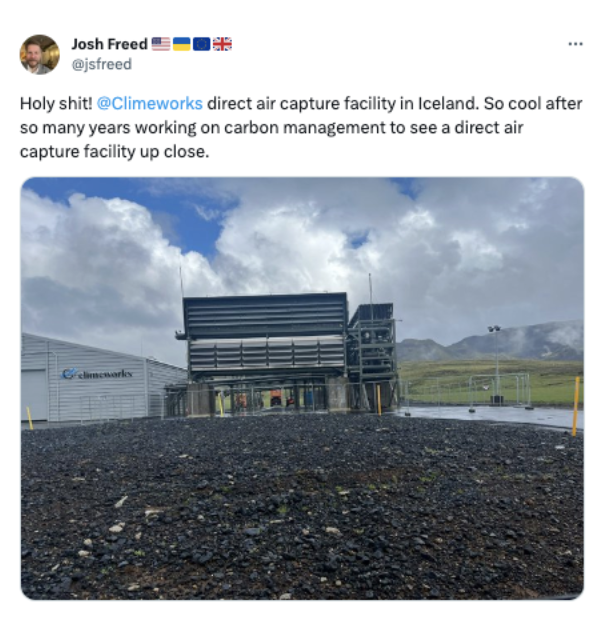On the Grid: Setting the Record Straight 6/30/23

Click HERE to subscribe to this weekly newsletter.
A bright spot in the news cycle this week: Bidenomics is working. For the uninitiated, here’s what that means:
- A $40 million investment in US infrastructure and $490 billion in private sector manufacturing commitments.
- A bold, popular plan to "transform the American economic and political landscape." That means places like Syracuse, Dalton, and Toledo are going to lead the charge in the new manufacturing revolution.
- A future-oriented framework that will create good-paying jobs for American workers, ease energy costs, and position the US to compete globally.
But with the appropriations process looming in the background, we’re concerned that the proposed slashes Republicans have made to energy programs will puncture the balloon of our economic success. The FY24 Energy and Water Spending Bill, approved by the House Appropriations Committee last week, would stand to rescind $5 billion in IRA spending and stifle Department of Energy programs, sending jitters through the market that could chill the private investment at the heart of our economic success. With negotiations moving to the Senate next week, we’re hoping for a resolution that will ensure long-term economic success.
P.S. Does this newsletter give you a fervid passion for clean energy? Want to join an amazing team of dedicated and passionate experts as we tackle some of the toughest challenges in the climate and clean energy space? Apply for Third Way’s Climate and Energy Fellowship!

Disgraced former President Donald Trump took sharp aim at Michigian’s electric vehicle (EV) industry over the weekend. Playing off auto workers’ growing anxieties around the EV transition, he stoked fear by blatantly lying and mischaracterizing the details. We’re taking a moment to set the record straight.
1. Trump Falsehood: “Electric cars will kill more than half of U.S. auto jobs and decimate the suppliers…and it’s going to decimate your jobs and it’s going to decimate more than anybody else, the state of Michigan.”
Third Way Fact-Check: This is patently false. Within the last two years alone, Michigan has seen a massive influx of private investment in EVs–$18.8 billion–creating 19,000 new jobs.
2. Trump Falsehood: “If somebody wants an electric car, I’m all for it. But you should be able to have a choice.”
Third Way Fact-Check: The EV transition has never been about limiting consumers’ freedoms nor will it ever be. But it is where the industry and customers are moving. By the end of the decade, we expect to see 40 million EVs on the road, alongside 240 million traditional gas-powered vehicles, offering Americans the choice to purchase whatever car they want.
3. Trump Falsehood: “They want every car to be all-electric, except you don’t make all-electric cars too much. You know who does — China.”
Third Way Fact-Check: Yes–China is a big player in the EV industry, dominating a majority of the supply chain, from raw materials and components for EV batteries to EV assembly . But with increasing demand from American consumers, the Administration is ensuring that US industries don’t take the backseat. Public and private investments in EVs are helping onshore supply chains and rebuild our industrial prowess so we can compete globally. Trump has no plan to position American businesses to lead and would allow foreign nations to dominate this lucrative market far into the future.

Last week, the Department of Energy’s Loan Programs Office (LPO) issued a $9.2 billion conditional commitment for a loan to Ford Motor Company to build three new EV battery factories in Kentucky and Tennessee. The single largest loan in the office’s history, it will support Ford’s joint venture with South Korean battery giant SK On Co. as the pair aim to produce up to 2 million EVs by 2026, a 1,412% increase from the 132,000 EVs Ford manufactured last year.
LPO’s announcement is part of a larger US industrial strategy that is boosting domestic manufacturing, onshoring key supply chains, and positioning American industries to compete with the Chinese supply chains that have long monopolized the EV space. Despite those benefits, United Auto Workers (UAW) President Shawn Fain has criticized the move out of concern for how wages and benefits compared to traditional auto manufacturing jobs.
Here’s our take: The transition to EVs is a major industrial change, driven largely by innovation, shifts in consumer demand, and federal policy that is working to retool our manufacturing base for a new era. In any market transition under a capitalist, free-market economy, there will inevitably be some ebbs and flows. Union leaders are understandably pushing for the strongest wages and protections for workers amidst these changes. UAW workers are highly skilled, and are a critical part of the future competitiveness of the auto industry, as automakers like Ford have been explicit about.
But let’s be clear–the EV transition is not shutting Americans out. In fact, it’s opening new opportunities for them. The Ford-SK On joint venture alone is creating 7,500 jobs and over the next three decades, the US has the potential to compete for nearly 10.2 million jobs in the EV sector. The US auto industry has the opportunity to enter into the next generation, strengthening our industries to stand up to global competitors who would ice out American jobs. The Biden Administration is working to minimize the impacts on workers and position them to benefit from the new jobs being created.
We can’t keep our eyes on the rearview mirror for much longer. By embracing the EV transition, we’re securing American competitiveness and economic prosperity in the long run.

When it comes to securing a more affordable, reliable, secure, and clean future, building domestic nuclear fuel supply chains is a necessity. With the authoritarian and increasingly unstable Russian government continuing to monopolize the global nuclear fuel market, particularly the fuel for many of our advanced reactors, expanding US production is a national security imperative.
Third Way has outlined the real costs of building a robust supply chain for high-assay low-enriched uranium (HALEU), an essential fuel source for our emerging advanced nuclear reactors, highlighting America’s capability to compete and win with proper investment. Each dollar we invest shores up our energy independence, propels our advanced reactor industry forward, and builds our leadership to counter Russia’s influence in the global nuclear market.

- Joel Dodge in The Atlantic nods to the economic struggles of his hometown of Syracuse, New York due to declines in the manufacturing industries and how industrial policy and investment in semiconductors are turning things around.
- The Economist remarks on how the US nuclear industry is experiencing a revival, fueled by investment from the Biden Administration, and how the industry’s success is essential for our climate, economic, and national security goals.
- David Roberts, host of the Volts Podcast series, chats with Anthony Wang, co-founder of ETFuels, about hydrogen fuel, the impact it can have in hard-to-electrify sectors, and the challenges of building the hydrogen market out.

Josh Freed, Senior Vice President for Third Way’s Climate and Energy Program, visits Orca in Iceland, the world’s first and largest direct air capture and storage plant.
Subscribe
Get updates whenever new content is added. We'll never share your email with anyone.


